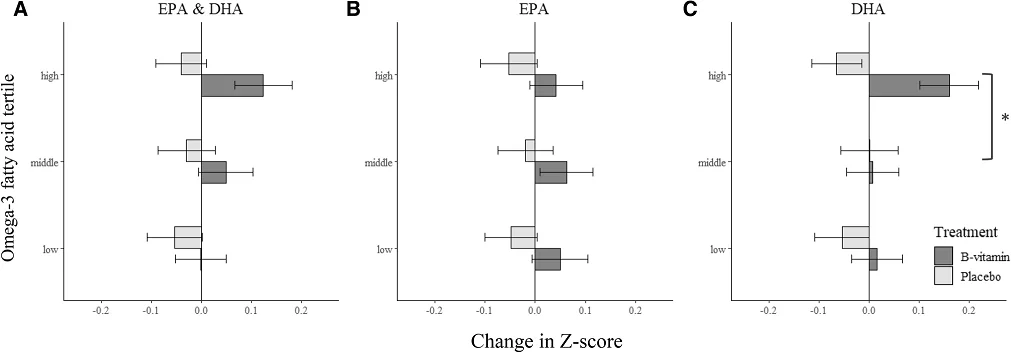Researchers publishing in the European Journal of Nutrition have discovered that a combination of B vitamins and the omega-3 fatty acid DHA is linked to decreased cognitive decline in older individuals.
A post-hoc analysis of previous results
The researchers came to their conclusion after analyzing the results of the B-proof trial, a Dutch study conducted between October 2008 and March 2013. This study was originally geared towards discovering the effectiveness of folic acid and vitamin B12 supplements; the researchers obtained their omega-3 results by analyzing deep-frozen blood plasma samples taken at the time of the study.
The researchers were able to collect the data they needed from nearly 200 people in total, approximarly half of which were in the placebo group. The average age of this group was about 71 and a half, although people in the treatment group were an average of two years younger than people in the placebo group.
This study focused on two specific omega-3 fatty acids: eicosapentaenoic acid (EPA) and docosahexaenoic acid (DHA). For each of these measurements, and for a combined measurement, the participants in each group were divided into three tertiles: low, middle, and high.
The researchers describe the cognitive measurements conducted in this test as an “extensive battery”, as they included short-term memory tasks such as digit and word memorization, long-term memory tasks such as letter-word recall, and detailed cognitive tests such as the trail-making test and the symbol-to-digit marking test. It also included the famous Stroop color-word test, in which a word written represents a different color than the ink it’s written in, such as the word “green” written in yellow.
At the beginning of the study, the baseline cognitive ability of participants in the low, middle, and high omega-3 fatty acid groups did not differ significantly.
One particular fatty acid shows a difference
Vitamin B supplementation appeared to be slightly associated with higher overall scores on cognitive tests after two years, although the difference was not statistically significant. This was independent of how much EPA was in the bloodstream.
However, the results were much different when examining DHA. In the middle and low DHA groups, cognitive ability was much less affected with vitamin B12 supplements. People with high levels of DHA did much better than the other two tertiles in the vitamin B12 group; in this analysis, a combination of vitamin B12 supplements and high levels of the omega 3 fatty acid DHA was shown to be significantly correlated with cognitive health.

This combination was correlated with scores on all of the cognitive tests; there was no individual subcomponent of cognitive performance that particularly stood out.
Conclusion
The researchers compare their results to those of other studies. One study, VITACOG, also showed a significant link between B vitamin supplements and omega-3 fatty acids in reducing cognitive decline [1] and brain atrophy [2]. A different post-hoc study showed that a combination of low homocysteine, an amino acid that is broken down by B vitamins, and omega-3 supplementation is associated with reduced cognitive decline [3]. These studies focused on people with cognitive impairment, while this new study was on cognitively healthy adults.
Pulling from other prior research, the researchers offer multiple biochemical explanations as to why DHA might be so important, such as ways in which B vitamin supplementation spurs the transfer of omega 3 fatty acids to the brain [4].
However, as a post-hoc analysis, this particular study can only show correlation, not prove causation, and the original cohorts were not powered for this analysis. As the researchers point out, a multifactorial clinical study is required to prove that vitamin B12 and DHA interact to improve cognitive performance in healthy older adults.
Literature
[1] Oulhaj, A., Jernerén, F., Refsum, H., Smith, A. D., & de Jager, C. A. (2016). Omega-3 fatty acid status enhances the prevention of cognitive decline by B vitamins in mild cognitive impairment. Journal of Alzheimer’s Disease, 50(2), 547-557.
[2] Jernerén, F., Elshorbagy, A. K., Oulhaj, A., Smith, S. M., Refsum, H., & Smith, A. D. (2015). Brain atrophy in cognitively impaired elderly: the importance of long-chain ω-3 fatty acids and B vitamin status in a randomized controlled trial. The American journal of clinical nutrition, 102(1), 215-221.
[3] Jernerén, F., Cederholm, T., Refsum, H., Smith, A. D., Turner, C., Palmblad, J., … & Freund-Levi, Y. (2019). Homocysteine status modifies the treatment effect of Omega-3 fatty acids on cognition in a randomized clinical trial in mild to moderate Alzheimer’s disease: the OmegAD study. Journal of Alzheimer’s Disease, 69(1), 189-197.
[4] Selley, M. L. (2007). A metabolic link between S-adenosylhomocysteine and polyunsaturated fatty acid metabolism in Alzheimer’s disease. Neurobiology of Aging, 28(12), 1834-1839.






